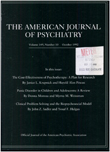Clinical correlates of the deficit syndrome of schizophrenia
Abstract
The authors propose using primary and enduring negative or deficit symptoms for dichotomizing schizophrenic patients into two groups, deficit and nondeficit. The validity of this approach was examined by comparing 17 deficit and 17 nondeficit patients for differences in premorbid adjustment and degree of neurological impairment. Deficit patients were characterized by poorer premorbid adjustment and greater neurological impairment. Neurological impairment was not related to premorbid adjustment in either group or in the total patient population. These findings support the utility of deficit symptoms for defining a more homogeneous subgroup of schizophrenia.
Access content
To read the fulltext, please use one of the options below to sign in or purchase access.- Personal login
- Institutional Login
- Sign in via OpenAthens
- Register for access
-
Please login/register if you wish to pair your device and check access availability.
Not a subscriber?
PsychiatryOnline subscription options offer access to the DSM-5 library, books, journals, CME, and patient resources. This all-in-one virtual library provides psychiatrists and mental health professionals with key resources for diagnosis, treatment, research, and professional development.
Need more help? PsychiatryOnline Customer Service may be reached by emailing [email protected] or by calling 800-368-5777 (in the U.S.) or 703-907-7322 (outside the U.S.).



